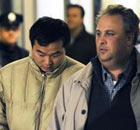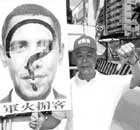Op-Ed Contributors
More openness to 'two sessions' welcomed
By Sun Shangwu (China Daily)
Updated: 2010-01-14 07:52
 |
Large Medium Small |
Starting this month, provinces, municipalities and autonomous regions across the country will kick off their annual "two sessions", a Chinese term widely used to describe the annual conferences of the people's congresses - the legislative bodies - and of the Chinese People's Political Consultative Conference (CPPCC), the political advisory body.
The two meetings are seen by many as the most important political gatherings each year for local officials and elites to draft their economic and social blueprints for the new year. The dual sessions at the national-level will be held in Beijing in March.
The congress delegates and CPPCC members, elected as public representatives as well as political advisors to top officials, are bound by law to put forward proposals and suggestions during the weeklong sessions. Many proposals focus on hot public topics, such as skyrocketing home prices, corruption, rural affairs and social welfare issues.
| ||||
It is the second time that province authorities have extended the invitation. They also did so last year.
China started its opening-up policy more than three decades ago. Openness has integrated the country more with the outside world and vast economic benefits have been generated for the Chinese people.
The country has also benefited politically from the openness. Increasing transparency of government affairs and wider access to information enable citizens to express their opinions in public affairs, which greatly pushes the government to improve.
The central authorities have also realized the importance of greater transparency to the public. One example is the unprecedented wide media coverage of the 17th National Congress of the Communist Party of China in 2007. The once closed-door Party session was opened to international media to help them better understand the Party's policies.
The two sessions are very important components of China's political system. Although the two sessions are different from the parliamentary practices in the West, all delegates of the congress and conference still shoulder the responsibility of making decisions on behalf of the public. They are obligated to respond to the concerns of the public and find solutions to problems plaguing regions.
The public also has the right to know how effectively their representatives are performing at the sessions. The media is one of the ways to allow the public into the sessions to measure their representatives' performance.
Yunnan province officials should be commended because they have enough confidence to present their issues to the media.
Many other local authorities are still hesitating to open their dual sessions to the overseas media or media from other regions and the reasons why are varied. But the basic concern is that they are afraid of media exposure on sensitive issues and they fear exposing these issues will put officials in an awkward position.
Feelings of suspicion of overseas media, including those from Hong Kong, Macao, Taiwan and foreign countries, are further fueled by the viewpoint that overseas media are "picky and have special interests on negative things".
In an era in which all kinds of information can be discovered, it is difficult to cover up things. Transparency is the best way for decision-makers to make the right choice.
Meanwhile, the mentality of session delegates, many of whom are officials, should also change to adapt to openness.
Many Chinese officials are media-shy and are afraid that negative reporting will do harm to their careers.
It is necessary for organizers of the sessions to offer basic training to delegates to psychologically prepare them to meet with the media.
Telling the truth maybe is the best way to deal with the media.
(China Daily 01/14/2010 page8)













